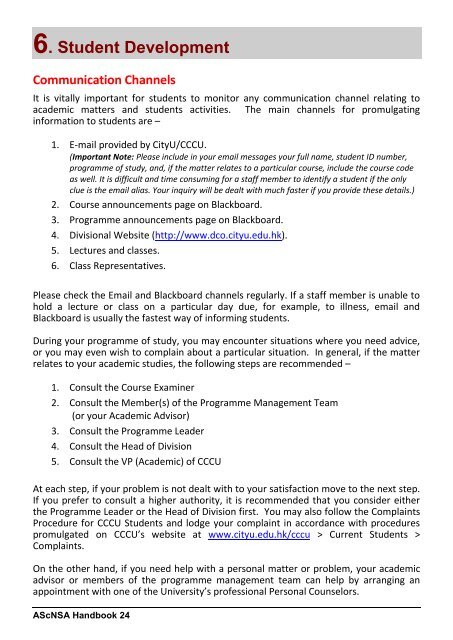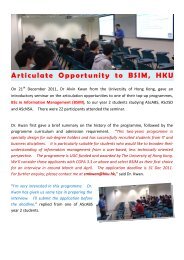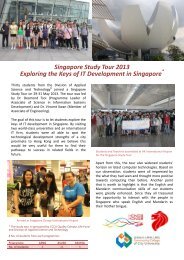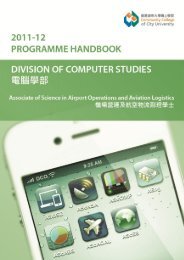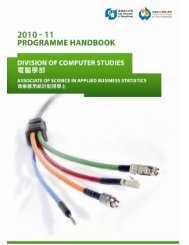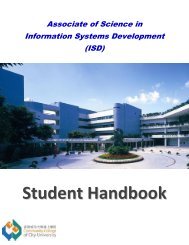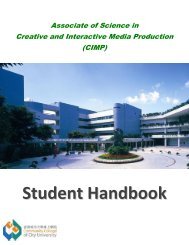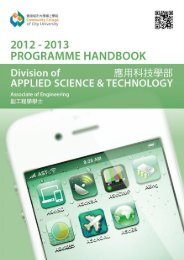AScNSA Handbook 1 - Division of Applied Science and Technology ...
AScNSA Handbook 1 - Division of Applied Science and Technology ...
AScNSA Handbook 1 - Division of Applied Science and Technology ...
Create successful ePaper yourself
Turn your PDF publications into a flip-book with our unique Google optimized e-Paper software.
6. Student Development<br />
Communication Channels<br />
It is vitally important for students to monitor any communication channel relating to<br />
academic matters <strong>and</strong> students activities. The main channels for promulgating<br />
information to students are –<br />
1. E-mail provided by CityU/CCCU.<br />
(Important Note: Please include in your email messages your full name, student ID number,<br />
programme <strong>of</strong> study, <strong>and</strong>, if the matter relates to a particular course, include the course code<br />
as well. It is difficult <strong>and</strong> time consuming for a staff member to identify a student if the only<br />
clue is the email alias. Your inquiry will be dealt with much faster if you provide these details.)<br />
2. Course announcements page on Blackboard.<br />
3. Programme announcements page on Blackboard.<br />
4. <strong>Division</strong>al Website (http://www.dco.cityu.edu.hk).<br />
5. Lectures <strong>and</strong> classes.<br />
6. Class Representatives.<br />
Please check the Email <strong>and</strong> Blackboard channels regularly. If a staff member is unable to<br />
hold a lecture or class on a particular day due, for example, to illness, email <strong>and</strong><br />
Blackboard is usually the fastest way <strong>of</strong> informing students.<br />
During your programme <strong>of</strong> study, you may encounter situations where you need advice,<br />
or you may even wish to complain about a particular situation. In general, if the matter<br />
relates to your academic studies, the following steps are recommended –<br />
1. Consult the Course Examiner<br />
2. Consult the Member(s) <strong>of</strong> the Programme Management Team<br />
(or your Academic Advisor)<br />
3. Consult the Programme Leader<br />
4. Consult the Head <strong>of</strong> <strong>Division</strong><br />
5. Consult the VP (Academic) <strong>of</strong> CCCU<br />
At each step, if your problem is not dealt with to your satisfaction move to the next step.<br />
If you prefer to consult a higher authority, it is recommended that you consider either<br />
the Programme Leader or the Head <strong>of</strong> <strong>Division</strong> first. You may also follow the Complaints<br />
Procedure for CCCU Students <strong>and</strong> lodge your complaint in accordance with procedures<br />
promulgated on CCCU’s website at www.cityu.edu.hk/cccu > Current Students ><br />
Complaints.<br />
On the other h<strong>and</strong>, if you need help with a personal matter or problem, your academic<br />
advisor or members <strong>of</strong> the programme management team can help by arranging an<br />
appointment with one <strong>of</strong> the University’s pr<strong>of</strong>essional Personal Counselors.<br />
<strong>AScNSA</strong> <strong>H<strong>and</strong>book</strong> 24


